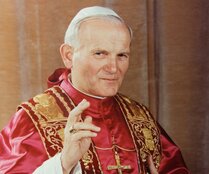
Editor's Note: The following is a modified abstract of a paper presented at a conference held by Christ the King Law Center (CKLC) on October 8, 2016 titled Make America Catholic Again! Portions of this abstract were also taken from traditional Catholic attorney and author Christopher Ferrara's book The Church and the Libertarian: A Defense of the Catholic Church's Teaching on Man, Economy, and State.
The natural right to ownership and use of private property would be protected by civil law in keeping with the teaching of the Church that "private ownership is in accordance with the law of nature.... [T]he practice of all ages has consecrated the principle of private ownership, as being pre-eminently in conformity with human nature, and as conducing in the most unmistakable manner to the peace and tranquility of human existence." [1]
However, while defending private property, the Church condemns economic liberalism's fundamental claim of an "absolute" right to own and use it so long as one does not physically invade the property of others. First of all, even mere reason dictates that one may not use one's property to do evil-for example, the use of a printing press for the publication of pornography or the use of medical equipment to perform abortions. Civil authority has every right to prevent immoral uses of property that harm the common good, by confiscation if necessary. [2]
Further, as the Church has taught for 2,000 years, all the bounty of the earth, being part of divine creation, is universally destined for the common good of humanity, even if some men hold title against others to the use and ownership of property. Hence the rich have no "absolute" right to keep their goods from the poor, and the poor have a claim in justice on those goods in times of necessity. As St. Thomas Aquinas famously teaches in line with all of Tradition: "It is not theft, properly speaking to take secretly and use another's property in a case of extreme need: because that which he takes for the support of his life becomes his own property by reason of that need." [3]. The classic example of this truth is the starving man who takes a loaf of bread from a rich man's pantry. The loaf belongs to the starving man, not to the rich man-a moral truth the [libertarians of the] Austrian [school of economics] views with utter incomprehension.
The Church has proclaimed infallibly through her universal and ordinary Magisterium (constant teaching) that every human being in need "has not only a claim in charity, but a strict right to as much wealth of the community as is necessary to maintain his life. Such was the doctrine of the Early Fathers of the Church, and such has been the doctrine of all her authoritative teachers down to the present hour." [4] The Church does not mean this in the socialist sense of a compulsory distribution of wealth, which in fact she opposes, but in the sense of a moral claim-again, in justice not merely in charity-on privately owned goods by those in need of sustenance for their very lives. Msgr. John A Ryan, who was a great defender of Catholic social teaching explains:
- The teaching of Basil in the East and Ambrose in the West may be taken as representing the mind of all the Fathers [of the Church]. The former tells the rich man that the superfluous bread, shoes and clothes in his possession belong to his hungry and naked neighbors, while the latter declares that the man of wealth who gives to the poor is not bestowing an alms, but paying a debt. [5]
In the encyclical Centesimus Annus, written to commemorate Pope Leo XIII's encyclical Rerum Novarum, Pope John Paul II declared that while "Leo XIII strongly affirmed the natural character of the right to private property, using various arguments against the socialism of his time," he was "well aware that private property is not an absolute value, nor does he fail to proclaim the necessary complementary principles, such as the universal destination of the earth's goods." [6] In Centesimus John Paul forcefully reminded the faithful that the "Church teaches that the possession of material goods is not an absolute right, and that its limits are inscribed in its very nature as a human right."
The right to private property not being absolute, however, its use would continue to be regulated by local laws providing for moderate and just taxation, zoning, esthetics, pollution control, abatement of nuisance, and the like. No community, county or region should have to tolerate such abuses of private ownership as the blight of vulgar advertising signs, cookie-cutter housing developments on stripped acreage, hideous structures, porn shops, nude dancing establishments, reckless discharge of toxic waste, excessive noise, and massive multinational retail operations plunking down in the midst of small towns and destroying local businesses.
[1] Rerum Novarum, nn. 9, 11.
[2] Even the new Catechism of the Catholic Church acknowledges this. See, CATECHISM OF THE CATHOLIC CHURCH, paragraph 2354 ("Civil authorities should prevent the production and distribution of pornographic materials.")
[3] ST, II-II, Q. 66, Art. 7.
[4] John A. Ryan, A Living Wage (New York: The MacMillan Company, 1920), p. 29.
[5] Ibid.
[6] John Paul II, Centesimus Annus (1991), n. 6.
 RSS Feed
RSS Feed
